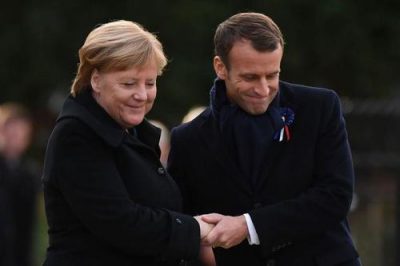France, Germany to Merge Economic and Defense Policies; Create Cross-Border “Eurodistricts”

Germany and France are set to forge a pact aligning their defense, diplomatic and economic policies in an unprecedented “twinning” pact “regarded as a prototype for the future of the European Union,” according to The Times‘ Oliver Moody.
German Chancellor Angela Merkel and French President Emmanuel Macron will sign the “Aachen treaty” later this month which will govern a coordinated diplomatic front as well as joint actions on peacekeeping missions.
What’s more – areas on both sides of the Franco-German border will be encouraged to establish “Eurodistricts” in which both countries would merge water, electricity and public transport networks.
Berlin and Paris will offer cash to incentivise these cross-border areas, which could involve shared hospitals, joint business schemes or environmental projects. Some officials regard these experiments as a petri dish for the integration of the EU. –The Times
No word on whether France will accept half of Germany’s refugees.
Additionally, both countries will lobby for Berlin to receive a permanent seat on the United Nations security council, where France already sits with the United States, China, Russia and Britain. Berlin was elected to the council as a non-permanent member last June.
France and Germany will also coordinate policy positions ahead of pivotal EU summits in order to make the bloc a “more decisive power on the world stage.” In short – the treaty will solidify the two countries’ commitments to “the values of multilateralism at a time when the global liberal order is under threat,” writes Moody.
The two countries will hold “regular consultations on all levels before major European meetings, and take care to establish common positions and issue joint statements,” according to the agreement, and will “stand up for a strong and effective common foreign and defence policy, and strengthen and deepen the economic and currency union.”
Both President Macron and Mrs Merkel have expressed frustration at the rise of populism and nationalism, and at Europe’s dithering in the face of problems such as climate change and mass migration.
On New Year’s Eve Mrs Merkel declared that Germany would “stand up and fight” for multilateralism and was ready to assume more responsibility in the world. A year ago diplomats from the countries began negotiating an agreement in the spirit of the 1963 Élysée treaty that formally set aside centuries of mutual hostility and set up the Franco-German alliance that has dominated the European project since. The brief document will be signed on January 22 in Aachen, the ancient German spa city near the borders with Belgium and the Netherlands. It is meant to be ratified by the two national parliaments that same day. –The Times
The new pact will advance Macron’s desire to use Franco-German solidarity to become more assertive as a global power, and will lay the groundwork for Franco-German defense acting as a “political steering group” on the security council. The two countries will also exchange diplomats and civil servants on a frequent basis, while ministers from one country will regularly sit in on the other’s cabinet meetings, according to The Times.
Militarily, the treaty aims to form a “common culture and common deployments” in overseas engagements.
A possible template for this arrangement is the 15,000-strong UN peacekeeping force in Mali, a former French colony that was partly overrun by rebellious Tuareg tribes and Islamist groups linked to al-Qaeda in early 2012.
While France bore the brunt of the fighting, the German armed forces have since supplied one of the largest non-African contingents, and some 370 German troops remain there today. –The Times
In Merkel’s new year’s address, the German chancellor said that hte concept of international cooperation was “coming under pressure,” and that her country must “stand up for and fight more strongly for our convictions,” while taking on “more responsibility for our own interests.” She also talked up a multilateral approach to international affairs, and that Germany would push for “global solutions.”
Trouble in EU paradise?
Some EU member nations are suspicious of the Aachen treaty, with concerns over the bloc’s two most powerful economies creating “a juggernaut capable of crushing dissent beneath its wheels.”
Meanwhile, Berlin’s potential permanent UN security council seat will surely rub some in Brussels the wrong way – and has been sharply condemned by parties on both ends of the ideological spectrum.
Alternative for Germany leader Alexander Gauland, for example, has described the pact as an “erosion of our national sovereignty.” In France, conservative leader Marine le Pen said it was an “unbalanced” decree from Germany.
Surely this will calm down the Yellow Vest movement.
*
Note to readers: please click the share buttons above. Forward this article to your email lists. Crosspost on your blog site, internet forums. etc.
Featured image is from Zero Hedge

